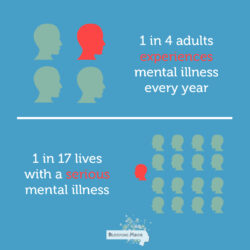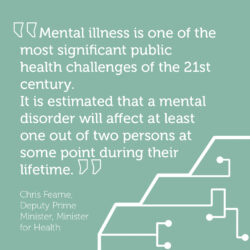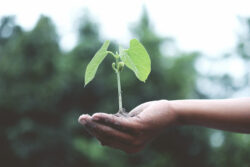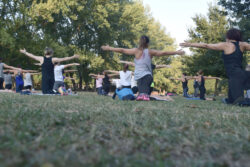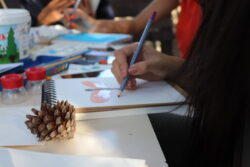Today, on World Mental Health Day, the focus is on inequalities across cultures and gender in the help received for mental health problems. With an increasing number of diagnoses but no increase in the number of help services provided, this creates a problem. Read on to find out about an alternative source of therapy that is free and accessible to everyone.
Facts and figures
Mental health problems are on the increase worldwide with a 13% increase in the last decade alone. 20% of children and adolescents suffer with a mental health problem and suicide is the second most common cause of death in young people, after accidental injuries. Mental health problems are the leading cause of disability and, statistically, people die earlier with a mental health condition by as much as two decades.
Despite the statistics, less than 2% of global health expenditure goes in support of this problem. This lack of investment means that people aren’t getting the help they require which is further exacerbating the problem. In addition, there is the obstacle of stigmatism in certain parts of the world making it difficult for people to talk about their problems for fear of judgment. People from low-income households and developing countries have even less support available.
Mental health effects of the COVID-19 pandemic
The pandemic brought a new wave of mental health problems as people were suffering from loneliness and depression due to isolation and not being able to take part in their normal daily lives and activities. Additionally, stress levels were increased as a result of job losses, financial issues, uncertainty about the future and anxiety about themselves or their loved ones catching the virus.
Since the end of lockdowns and administration of the vaccines, routine GP and hospital appointments are being resumed but after a lengthy delay there is a backlog of appointments meaning long waiting times for people to get the help they need. This could mean a delay in the receipt of counselling services or people not being able to get the help they need for a physical condition which is, in turn, affecting their mental health. Unless more investment is made in the health sector, this will continue to be a problem.
What is ecotherapy and how can it help?
With an increase in mental health problems and a lack of help available, more and more people are turning to ecotherapy as a form of self-help. This involves reconnecting with nature by immersing oneself in the environment which has been scientifically proven to improve mental health. Since so many people live in a built-up environment which directly correlates with mental health problems, many people lose touch with the natural world.
Spending more time in nature can give a sense of place, relax a stressed mind, and help gain a bigger perspective. There are positive physical effects as well such as getting Vitamin D from sunlight and, if you get into gardening, research has shown that exposure to a healthy type of bacteria that lives in soil called Mycobacterium vaccae can increase levels of serotonin (the happy hormone) which in turn can increase your immunity levels. In addition, the social aspects of activities and meeting like-minded people can encourage discussion and openness of mental health issues which is extremely powerful in recovery.
In response to the scientifically-proven positive effects of ecotherapy, doctors are currently prescribing practices such as mountain walking and community gardening. At a medical practice in Manchester, England, for example, patients with anxiety or depression were asked to care for and grow a plant in their homes. After a certain amount of time, they were asked to bring their plant into the practice so that it could be planted in the community garden with other people’s plants.
This increased feelings of relaxation as people spent time in the garden and allowed them the opportunity to develop a sense of community with others who had the same task. Uptake of wider community tasks such as litter picking also resulted. This is clear indication that this type of therapy can work and is definitely worth a try for those suffering.
Different types of ecotherapy
Ecotherapy doesn’t just mean growing plants or going for a walk. It can take a number of forms including:
- Wilderness and adventure therapy such as camping and hiking, learning valuable skills such as navigation and bushcraft.
- Mindfulness in nature means using your five senses to understand everything around you and focus on the present moment.
- Earth grounding such as walking barefoot, laying down outside or wild swimming. This allows electrical charges from the earth to transfer to your body, increasing feelings of wellness.
- Have a look at our Guide to Ecotherapy at Home and our Guide to Ecotherapy at Home for Kids.
- Book one of our group team building sessions.
- Animal-assisted therapy such as birdwatching or working with dogs or horses.
- Meditation and yoga outdoors.
- Foraging.
- Wood working skills.
- Community gardening.
- Walk and Talk.
- Arts and crafts outdoors.
How to get started
There are many online resources available (click the links above) to inspire you and get you started on your journey towards recovery. Ecotherapy is a low cost, effective method to relieve the struggle of mental health problems with no long waiting times for treatment either. You don’t need to have a garden and ecotherapy is accessible to everyone, in some form. There are many community groups you can join to connect with others to kick feelings of loneliness and develop social connections as well as a better connection to the environment which we are all part of.
By Belinda Hodder, BirdLife Malta Communications Assistant
Belinda Hodder is an Erasmus+ volunteer following a European Solidarity Corps programme

